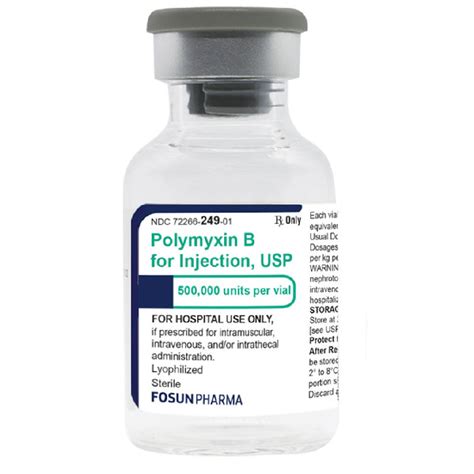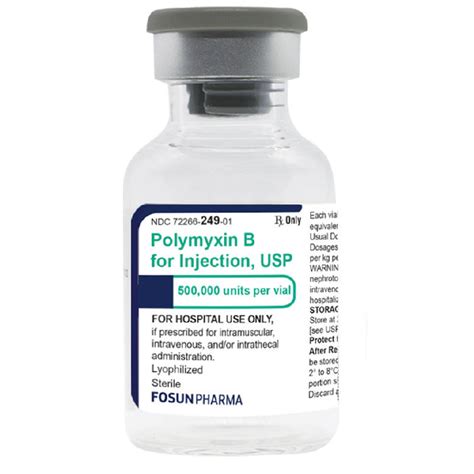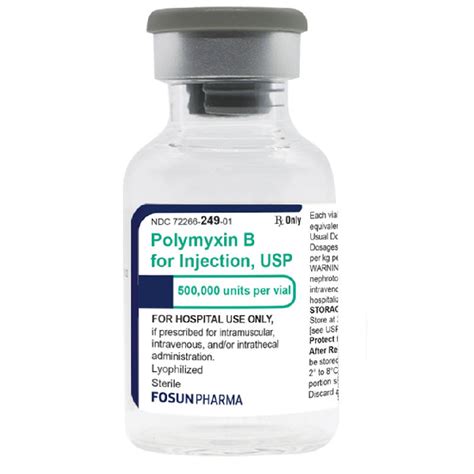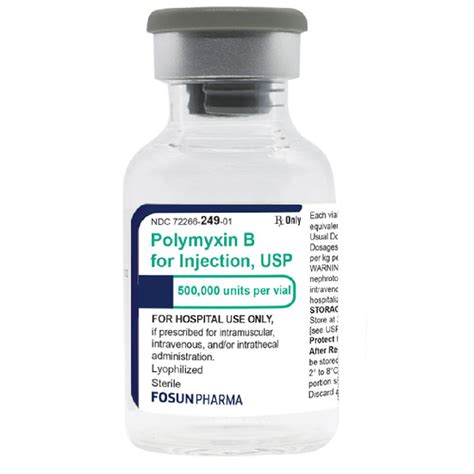Intro
Discover Polymyxin B Sulfate uses, a potent antibiotic for bacterial infections, including urinary tract infections, meningitis, and sepsis, with applications in veterinary medicine and ophthalmic treatments.
Polymyxin B sulfate is an antibiotic that has been used for many years to treat various bacterial infections. It is a member of the polymyxin class of antibiotics, which are known for their ability to target and kill gram-negative bacteria. The importance of polymyxin B sulfate lies in its effectiveness against a wide range of bacterial infections, including those caused by drug-resistant strains. In recent years, the use of polymyxin B sulfate has increased due to the growing concern of antibiotic resistance. As a result, it is essential to understand the uses, benefits, and potential risks associated with this antibiotic.
Polymyxin B sulfate is used to treat various types of infections, including urinary tract infections, respiratory tract infections, and infections of the skin and soft tissues. It is also used to treat infections caused by gram-negative bacteria, such as Pseudomonas aeruginosa and Acinetobacter baumannii. The antibiotic works by disrupting the bacterial cell membrane, ultimately leading to the death of the bacterial cell. This mechanism of action makes polymyxin B sulfate an effective treatment option for infections caused by bacteria that are resistant to other antibiotics.
The use of polymyxin B sulfate has been increasing in recent years due to the growing concern of antibiotic resistance. Many bacteria have developed resistance to commonly used antibiotics, making it challenging to treat infections. Polymyxin B sulfate has been shown to be effective against many of these resistant strains, making it a valuable treatment option. However, it is essential to use polymyxin B sulfate judiciously and only when necessary to minimize the risk of developing resistance.
What is Polymyxin B Sulfate?

How Does Polymyxin B Sulfate Work?
Polymyxin B sulfate works by disrupting the bacterial cell membrane, ultimately leading to the death of the bacterial cell. The antibiotic binds to the lipopolysaccharide layer of the bacterial cell membrane, causing the membrane to become permeable. This leads to the loss of essential nutrients and ions, ultimately resulting in the death of the bacterial cell. Polymyxin B sulfate is effective against a wide range of gram-negative bacteria, including Pseudomonas aeruginosa, Acinetobacter baumannii, and Klebsiella pneumoniae.Uses of Polymyxin B Sulfate

Benefits of Polymyxin B Sulfate
The benefits of polymyxin B sulfate include: * Effective against a wide range of gram-negative bacteria * Effective against bacteria that are resistant to other antibiotics * Can be used to treat various types of infections, including urinary tract infections and respiratory tract infections * Available in various formulations, including injectable solutions, ointments, and creamsSide Effects of Polymyxin B Sulfate

Precautions and Warnings
When using polymyxin B sulfate, it is essential to follow the precautions and warnings, including: * Use with caution in patients with kidney or liver disease * Use with caution in patients who are pregnant or breastfeeding * Avoid using polymyxin B sulfate in combination with other nephrotoxic or neurotoxic agents * Monitor kidney and liver function regularly while using polymyxin B sulfateAdministration and Dosage

Interactions with Other Medications
Polymyxin B sulfate can interact with other medications, including: * Aminoglycosides, such as gentamicin and tobramycin * Cephalosporins, such as cefepime and ceftriaxone * Fluoroquinolones, such as ciprofloxacin and levofloxacin * It is essential to inform your doctor of all medications you are taking before using polymyxin B sulfate.Resistance and Limitations

Future Directions
The future of polymyxin B sulfate lies in its potential to treat infections caused by multidrug-resistant bacteria. Researchers are exploring new formulations and combinations of polymyxin B sulfate to enhance its effectiveness and minimize its side effects. Additionally, the development of new antibiotics that target gram-negative bacteria is crucial to addressing the growing concern of antibiotic resistance.Conclusion and Final Thoughts

We invite you to share your thoughts and experiences with polymyxin B sulfate in the comments below. Have you or a loved one used polymyxin B sulfate to treat a bacterial infection? What were your experiences with the antibiotic? Share your story and help others understand the importance of responsible antibiotic use.
What is polymyxin B sulfate used for?
+Polymyxin B sulfate is used to treat various types of bacterial infections, including urinary tract infections, respiratory tract infections, and infections of the skin and soft tissues.
How does polymyxin B sulfate work?
+Polymyxin B sulfate works by disrupting the bacterial cell membrane, ultimately leading to the death of the bacterial cell.
What are the side effects of polymyxin B sulfate?
+The side effects of polymyxin B sulfate include nephrotoxicity, neurotoxicity, allergic reactions, and respiratory problems.
Can polymyxin B sulfate be used in combination with other antibiotics?
+Yes, polymyxin B sulfate can be used in combination with other antibiotics, but it is essential to use caution and monitor for potential interactions.
What is the typical dosage of polymyxin B sulfate?
+The typical dosage of polymyxin B sulfate varies depending on the type of infection being treated and the patient's age and weight, but the typical range is 1-2 million units per day for adults.
